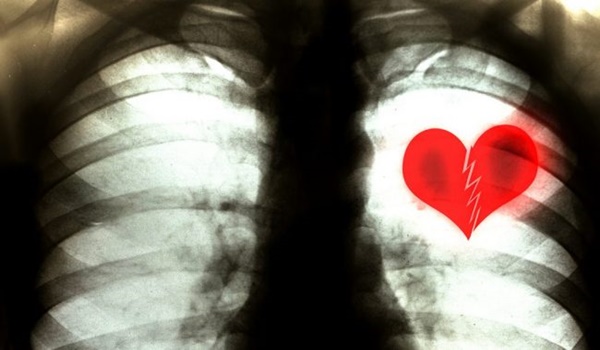The Broken Heart Syndrome has been an intriguing topic for decades, and there’s a clear explanation behind its symptoms.
We all know someone who can’t survive a breakup. We’ve all been through a painful romance at least once in our lifetime. If you think that this is just you overreacting, it’s time to think again. The “Broken heart syndrome” actually exists, and many people deal with it in the US.
Experts like to call it “stress-induced cardiomyopathy.” According to Dr. Matthew Lorber, a psychiatrist at Lenox Hill Hospital in New York, this is a condition caused by “sudden extreme stress.”
“Broken heart syndrome – which is, in fact, a real thing – is when someone finds out some shocking news, typically terrible news, and there’s a massive release of these stress hormones that are released into the bloodstream, and the heart is then bombarded with these stress hormones,” Dr. Lorber explains. ”
This could be the news, certainly, of a loved one dying,
which is where the ‘broken heart syndrome’ name comes from. This could be the news of getting a divorce.
This could be a boss coming in and telling you that you’re fired – anything that can cause intense stress. Anything that causes a shock or startles can cause broken heart syndrome.”
Lorber has a big warning. The shock doesn’t have to be related to a negative event. It can also happen to a man who is told that he will become a dad for the first time. Stress hormones cause a temporary weakening of the left ventricle, thus affecting normal heart function. Stress paralyzes the heart and disrupts normal circulation.
Some risk factors may increase your chances of developing this condition, but truth is, a broken heart syndrome can happen to anybody. You may be the healthiest person on planet earth and you will still have a broken heart.
Experts explain that 90% of all sufferers are women. Ladies with a history of mental health problems and neurological problems have a higher risk of developing this condition. Individuals above 50 have a higher risk, too. A history of heart disease doesn’t affect the risk of developing a broke heart syndrome.
Most sufferers can get proper treatment. This doesn’t change the fact that all Americans need to educate themselves on the initial signs in order to seek medical help before it’s too late.
The broken heart syndrome often mimics a heart attack and may cause chest pain, shortness of breath, low blood pressure, nausea, dizziness, fainting, or an irregular heartbeat.
The stress-based theory is correct, and many expert have confirmed it. however, Dr. Kevin R. Campbell, a cardiologist and assistant professor of medicine at the University of North Carolina believes that the cause of the syndrome is still unknown.
“It’s really an interesting thing we don’t fully understand,” he said. Dr. Campbell explained that a group of Japanese researchers were the first to describe this condition in 1990. They used to call it “Takotsubo syndrome.”
“If you actually take a picture of the heart in the operating room, it looks dilated and balloon-like,” the doctor said, explaining the origin of the name. The human heart is shaped like the Takotsubo pots Japanese use to catch octopuses.
The broken heart syndrome is similar to a heart attack but there’s one major difference. Patients with Takotsubo syndrome “don’t have any blockages in the heart.” Their arteries look normal, but the heart is dilated, ballooned and its function is really week.
Source: edition.cnn.com


